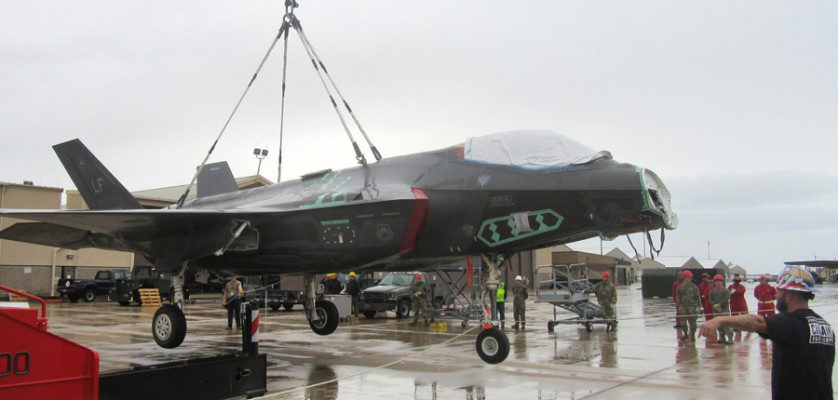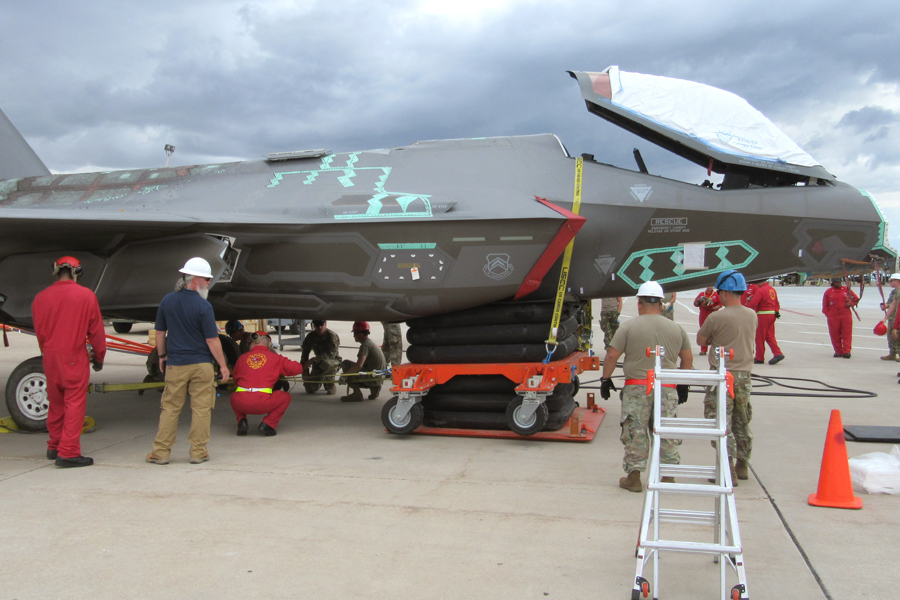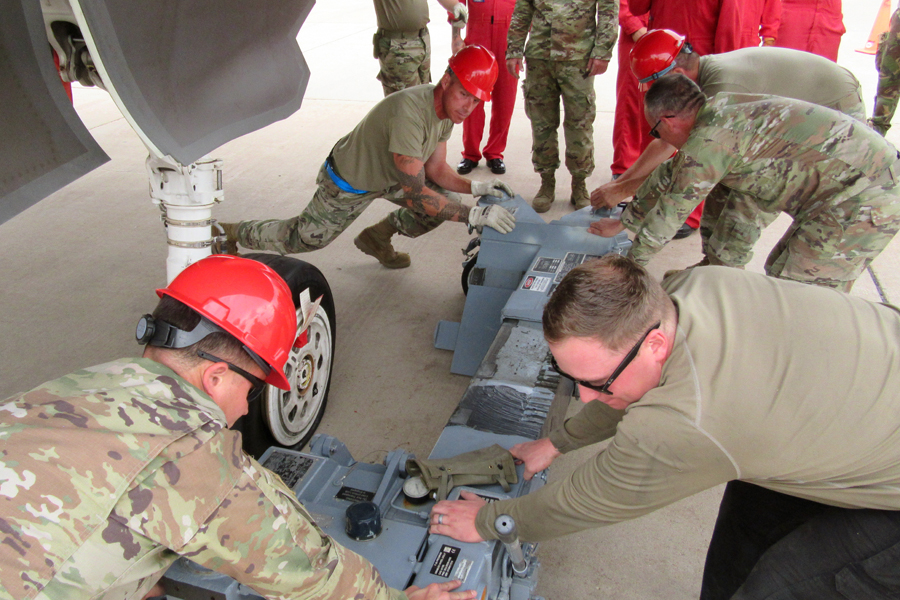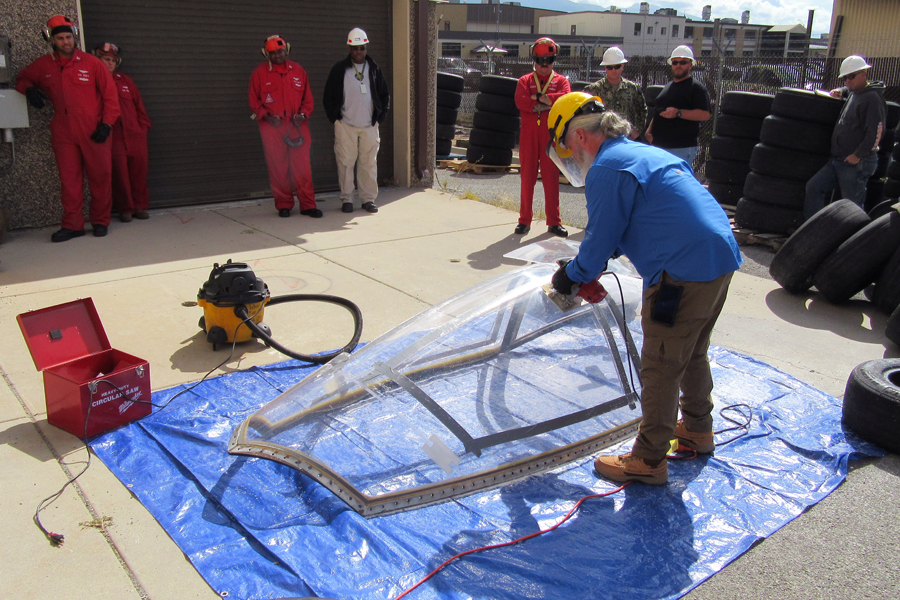por Todd Cromar | Hill AFB, Utah - 13 de octubre de 2022

El 388º Grupo de Mantenimiento de la Base Aérea de Hill, en Utah, organizó recientemente un curso de recuperación de accidentes de F-35, el primero de su clase, en el que se utilizó un F-35A Lightning II recién retirado y ahora reensamblado.
En el curso de recuperación de aeronaves accidentadas o inutilizadas, de cinco días de duración, impartido por la Oficina de Programas Conjuntos del F-35, participaron 29 técnicos de mantenimiento del programa F-35, de servicios afines y de países asociados. La formación trató sobre cómo actuar de forma segura y eficaz en diferentes situaciones, como el colapso del tren de morro, la extracción del piloto y el izado de la aeronave.
"Esta formación tiene un valor incalculable no sólo para nuestros militares estadounidenses, sino también para nuestros países socios que operan el F-35", dijo el sargento mayor Andrew Wilkow, instructor y uno de los diseñadores del curso. "Desgraciadamente, de vez en cuando ocurren percances, lo que hace necesario contar con personal debidamente formado en los procedimientos de recuperación y en cómo llevar a cabo estas tareas de forma segura."

El entrenamiento para este tipo de escenarios "del peor de los casos" requiere una aeronave que se pueda desbastar un poco.
"Es sencillamente imposible levantar un reactor operativo con una grúa, colapsar el tren de aterrizaje delantero y luego posar el morro del avión en el suelo sin correr un riesgo significativo de dañarlo", dijo Wilkow. "La mejor manera de llevar a cabo una formación práctica en el mundo real es utilizar un fuselaje de demostración readaptado".
El 388º Grupo de Mantenimiento, junto con la Oficina del Programa Conjunto del F-35, reconstruyó un F-35 retirado del servicio en junio.
El avión utilizado procedía de otra unidad y sufrió un incendio en el motor durante el arranque mientras estaba asignado temporalmente en Mountain Home AFB, Idaho, en 2016. Tras el incidente, la aeronave fue transportada a Hill AFB para su posible reparación, donde finalmente se tomó la decisión de condenarla debido a los grandes daños y a los elevados costes de reparación.

Wilkow dijo que mantener la aeronave en Hill AFB tenía sentido porque el Ala de Caza 388 y el Ala de Caza 419 de Reserva, que ya vuelan y mantienen el F-35A, y el Complejo Logístico Aéreo de Ogden, que realiza todo el mantenimiento a nivel de depósito del F-35, están ubicados aquí.
Una vez tomada la decisión de convertir el avión en una plataforma de entrenamiento del F-35 para el CDDAR, el 388º Grupo de Mantenimiento pudo volver a montar la mayor parte del fuselaje en tres semanas con la ayuda de equipos, piezas y herramientas de la Oficina del Programa Conjunto y del 309º Grupo de Mantenimiento de Aeronaves del ALC de Ogden.

Los estudiantes practican los procedimientos de extracción de piloto en un dosel de la aeronave durante un nuevo curso de formación Crash Damaged o Disabled Aircraft Recovery 13 de septiembre 2022, en la Base de la Fuerza Aérea de Hill, Utah. El primer curso CDDAR de la Oficina del Programa Conjunto del F-35 incluyó a 29 técnicos de mantenimiento de todo el programa F-35, servicios hermanos y países asociados al F-35.
"El avión había estado almacenado por piezas en el depósito, así que pasamos tres días revisando las piezas para confirmar que todo estaba allí antes de trasladarlo a un hangar donde se reconstruyó el fuselaje", explica Wilkow.
Durante este mismo periodo, creó el programa del curso y los planes de lecciones para el JPO del F-35, basándose en la experiencia en el desarrollo de cursos que adquirió durante su anterior destino como instructor en el 372º Escuadrón de Entrenamiento.
Wilkow da las gracias a todos los implicados en la reconstrucción y por su apoyo general al proyecto, en particular a los escuadrones de generación de cazas que dedicaron una parte importante de su personal a recomponer el avión.
Los funcionarios dijeron que el curso inicial de formación CDDAR fue un éxito y que el JPO del F-35 ya tiene solicitudes para asistir a futuros cursos.
"Los comentarios de las personas que asistieron al primer curso fueron extremadamente positivos y agradecidos de que ahora haya un curso que ofrece una oportunidad práctica para la recuperación de accidentes de F-35", dijo Dan Santos con el F-35 JPO. "Este curso será extremadamente beneficioso en la preparación de los socorristas del F-35 para responder a un percance".


